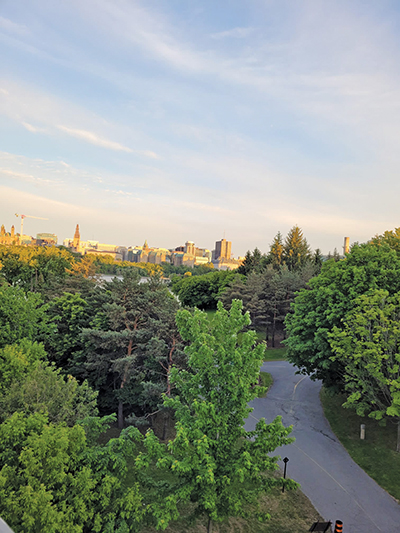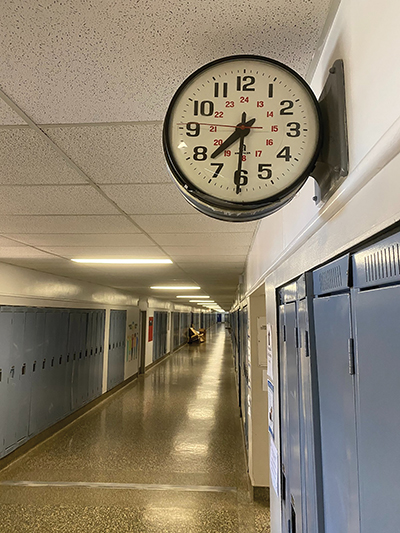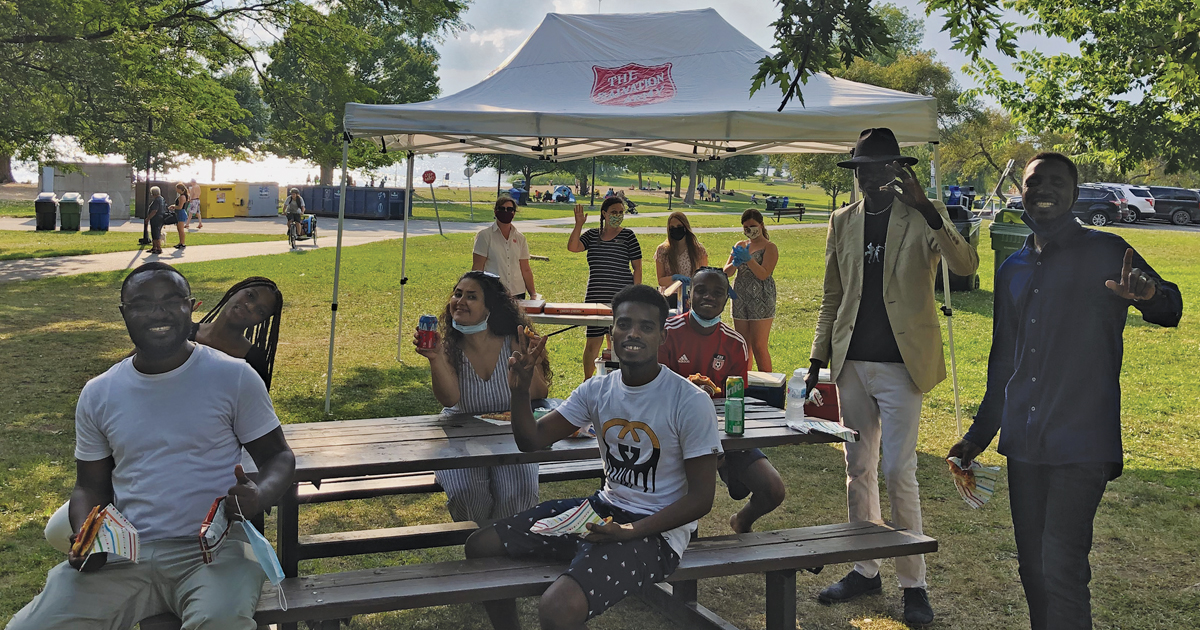Imagine that you are a young person who has just immigrated to Canada in this time of worldwide uncertainty due to the pandemic. You and your parents must learn to navigate a new culture, language, climate and way of life, all while experiencing varying degrees of lockdown in your new environment.
How can front-line ministry workers reach those newcomers and racialized young people and address their needs around mental health and wellness, in a way that aligns with pandemic guidelines?
With a passion to help young people who find themselves in a new country amid the uncertainty of COVID-19, Both Gakah reached out to The Salvation Army’s Barrhaven Church in Ottawa with an innovative program called PhotoVoice.
Empowering Youth
Gakah, along with his wife and two small children, immigrated from civil war-torn South Sudan via a refugee camp in Ethiopia in 2018, so he understands the pressures and fears surrounding a new life in a new country. He and his co-facilitator, Reuben Nashali, came to the Army with a proposal for a virtual program for youth aged 15-29. For The Salvation Army in Barrhaven, the opportunity was too good to pass up.
PhotoVoice uses the medium of photography to address issues around mental health and wellness for racialized, refugee and newcomer youth.
“PhotoVoice is a community-based participatory action research method that allows people to identify, represent and enhance their community through a specific photographic technique,” says Nashali. “It aims to empower participants and induce change by informing policy makers of community assets and deficits.
“PhotoVoice is especially useful for youth because it provides them with the opportunity to develop their identity and a social morality for becoming a positive agent within their communities and society,” he continues. “PhotoVoice demonstrates in a meaningful and candid way how youth view the concept of mental health and the pathways to maintaining ‘good mental health.’ ”
Cultivating Conversation
Much groundwork was laid in preparation for the program at Barrhaven. New job descriptions for PhotoVoice facilitators were developed with the intention that the program be run multiple times, and in hopes that it might be offered at other Salvation Army locations across the territory.

Nashali and Gakah recruited 13 participants from newcomer and racialized youth populations, and launched the program at the beginning of July. The group met over Zoom each week, sharing their photos throughout the week using WhatsApp. There was a virtual introductory session, followed by four focus sessions, and a wrap-up pizza party held in person at Mooney’s Bay Park, which was hosted by The Salvation Army’s Barrhaven community ministries.
The first framing question was “What does mental-health wellness look like for us?”
Participants each replied according to their own practice. Bahar responded that mental wellness means going out in nature and spending time by himself, backing up his statement with a glorious photograph of the city skyline silhouetted behind the Ottawa River. Rachel sent a photograph of a delicious-looking plate of her traditional food.
Week two’s conversation centred on the question “What does our safe space look like?”
Reuben took a photo of a rest stop on a highway overlooking a lake, saying his safe space was being in the car and going for long road trips. Sonko’s panorama of a rock face above a forest, overlooking a lake, was accompanied by the statement “Parks and landscapes are always safe and I love visiting them.”
Week three addressed the question “What makes us happy?”
Aboiya’s photograph was of a beautiful, beaded bracelet given to her by her mother. Jean Marie sent a photo of his church, saying, “My church makes me happy. Whenever I go to church, I meet a lot of lovely people.”
The last framing question was “What makes us unhappy?”
Sarah’s photo was of an empty school hallway. She said, “I am unhappy we are studying online. I missed being at the actual classroom and learning with my friends.” Maombi, Claude and Jean Marie all put their names to a photo that showed a picnic table, covered in 40 centimetres of snow, with the caption, “We took this picture January 2021 when we came to Canada. Winter makes us unhappy. This is very cold.”
The framing questions and the photographic responses acted as a springboard to more in-depth discussions around the factors that, for the youth, contribute to negative mental health, such as loneliness and stress attributed to COVID-19; racism and discrimination; lack of resources in the community; financial barriers to mental-health supports; and age restrictions for social and community programs.

It also resulted in discussions around the factors that contribute to positive mental health, such as their social support system including family and friends, religion and faith, and peer and mentorship support; workplace and employment opportunities; cultural partnerships; feeling safe; nature and the outdoors; and food.
More Than a Creative Exercise
For many cultures, conversations around mental health and wellness are highly stigmatized, so for most participants, this was the first time they had ever discussed these topics openly and in a healthy way.
When asked how taking part in PhotoVoice made an impact on their lives, all of the participants said it had been a positive experience.
Jean Marie stated that one of the important lessons he learned through PhotoVoice was “seeking help when you need help.”
“When I joined the PhotoVoice,” Sonko said, “I learned that in me is where I can find peace.”
For Maomi, PhotoVoice was more than a creative exercise: “Apart from learning that I can take good pictures, I also learned how to protect my mental health. I learned that my mental health is like my physical health; it needs good care like my body.”
Through photography, each young person invited the others to see the world from their perspective. PhotoVoice gave them a platform to raise their voice and speak plainly about the joys and struggles of their own lived experience. It helped them to understand that they are not alone, and it is always OK to ask for help when it is needed.
Christina Bulgin is the community ministries co-ordinator at The Salvation Army’s Barrhaven Church in Ottawa.
This story is from:










Leave a Comment